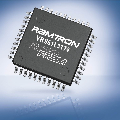Hyperdimensional (HD) computing is an highly error-resilient computational paradigm that can be used to efficiently perform language classification, data retrieval, and analogical reasoning tasks on error-prone emerging hardware technologies. HD computation is storage-inefficient and often requires computing over 10,000-dimensional bit vectors. Prior work either leaves hypervectors unoptimized or dynamically tunes HD computation parameters (e.g., hypervector dimension) to deliver the desired accuracy. These approaches are time-consuming, lack accuracy guarantees, and do not generalize well. We present Heim, a framework for statically optimizing HD computation parameters to minimize resource usage in the presence of hardware error. Heim guarantees the optimized computation satisfies a user-provided target accuracy. Heim deploys a novel analysis procedure that unifies theoretical results in HD computing to systematically optimize HD computation. We develop four analysis-amenable data structures that leverage Heim to perform aggressive space-saving optimizations, and optimize these data structures to attain 99% query accuracy on both binary memory and multiple-bit-per-cell resistive memory. Heim-optimized data structures deliver 1.31x-14.51x reductions in hypervector size and 2.191x-27.27x reductions in memory usage while attaining 98.96-99.75% accuracy. Heim-optimized data structures deliver up to 41.40% accuracy improvements over dynamically tuned parameters. Heim computes parameters significantly faster than dynamic approaches.
翻译:超维计算是一种高度容错的计算模式,可用于在容易出现故障的新型硬件技术上有效地执行语言分类、数据检索和类比推理任务。超维计算存储效率低下,通常需要计算超过10,000维的比特向量。以前的工作要么保留超向量的未优化状态,要么动态调整超维计算参数(例如,超向量维度)以达到所需的准确度。这些方法耗时,缺乏精确度保证,且不能很好地推广。我们提出了Heim,一种用于静态优化超维计算参数以在硬件错误情况下最小化资源使用的框架。Heim保证所优化的计算满足用户提供的目标准确度。Heim部署了一种新颖的分析过程,将超维计算的理论结果统一起来,以系统地优化超维计算。我们开发了四种可分析的数据结构,利用Heim来执行激进的节省空间优化,并优化这些数据结构以在二进制存储器和多位每单元电阻性存储器上实现99%的查询准确度。Heim优化数据结构分别实现了1.31x-14.51x的超向量尺寸缩减和2.191x-27.27x的内存使用缩减,同时实现了98.96-99.75%的准确度。与动态方法相比,Heim优化数据结构实现了高达41.40%的准确度提升。Heim计算参数的速度显著快于动态方法。


